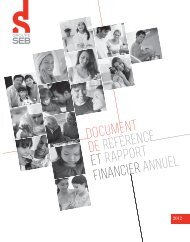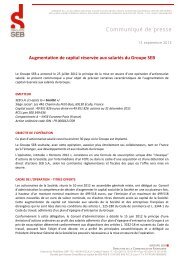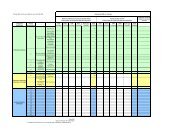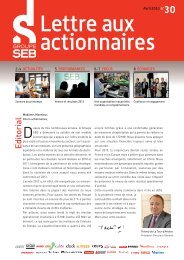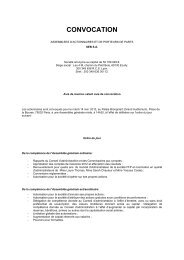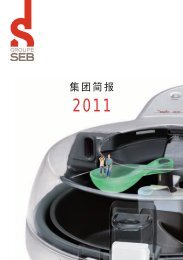Financial Report and Registration Document 2010 - Groupe Seb
Financial Report and Registration Document 2010 - Groupe Seb
Financial Report and Registration Document 2010 - Groupe Seb
You also want an ePaper? Increase the reach of your titles
YUMPU automatically turns print PDFs into web optimized ePapers that Google loves.
1<br />
GROUPE SEB IN <strong>2010</strong><br />
RISK MANAGEMENT<br />
RISK MANAGEMENT<br />
<strong>Groupe</strong> SEB pursues a policy of active, prudent management of the risks<br />
inherent in its business, the purpose of which is to defend the Group’s<br />
assets <strong>and</strong>/or interests of its stakeholders: shareholders, employees, clients,<br />
consumers, suppliers, etc., without forgetting environmental aspects.<br />
This approach is based on a detailed mapping <strong>and</strong> analysis of the main<br />
risks faced by the Company, which makes it possible to rank them on the<br />
basis of their potential impact on the Group’s operations <strong>and</strong> performance,<br />
<strong>and</strong> on the probability of such risks occurring. A comprehensive review of<br />
these risks is carried out regularly with the Group Executive Committee <strong>and</strong><br />
the Audit Committee.<br />
1<br />
RISKS INHERENT TO OPERATIONS<br />
COUNTRY-SPECIFIC AND ECONOMIC<br />
SITUATION RISKS<br />
The international nature of the Group’s business exposes it to currency<br />
risk (covered in Note 26.2.1 to the Consolidated <strong>Financial</strong> Statements)<br />
but also risks of political instability, economic, monetary or labour risks,<br />
especially in Asia, the Middle East <strong>and</strong> South America. In addition to<br />
these risks, certain countries have under-developed legal systems or<br />
those which offer little in the way of intellectual property protection, import<br />
taxes (e.g. Turkey for certain small electrical products), restrictive measures,<br />
exchange controls, etc. These factors may disturb or even penalize the<br />
Group’s business or financial situation. Nonetheless, this big international<br />
presence also offers protection through wide geographical coverage <strong>and</strong><br />
risk diversification.<br />
Alongside this, Group sales inevitably depend on the economic climate <strong>and</strong><br />
whether consumption holds up or not, which, in turn, is related to consumer<br />
purchasing power <strong>and</strong> the financial health of our retail distribution network.<br />
In this respect, the end of 2008 <strong>and</strong> the entire 2009 were complex, with the<br />
Group having to deal with various situations in various countries: serious<br />
recession <strong>and</strong> collapse of dem<strong>and</strong> (Russia, USA, UK, etc.); serious recession<br />
but resistance in small electrical appliances <strong>and</strong> high performance by<br />
the Group (Spain, Greece, Japan, etc.); a moderate crisis <strong>and</strong> sustained<br />
consumption (France, Germany, Brazil), etc. In consideration of the very<br />
nature of the business (focus on the home) <strong>and</strong> the limited investment<br />
represented by small domestic equipment, the small electrical appliance<br />
sector held up better than others <strong>and</strong>, in several markets, the Group’s<br />
results were even totally opposite to the economic situation: this was the<br />
case for Spain, Japan, etc. <strong>2010</strong> unfolded in a generally more buoyant<br />
environment, without any major glitches, but recovery was not the same in<br />
all zones. Central Europe joined the crisis quite late <strong>and</strong> only showed signs<br />
of a recovery towards the end of the year, while after months of sustained<br />
dem<strong>and</strong>, business in Spain, on the contrary, shrank in the last quarter.<br />
RISKS RELATING TO SOLD PRODUCTS<br />
Risks of warranty or liability claims<br />
<strong>Groupe</strong> SEB makes consumer safety an absolute priority. In this respect,<br />
it affords maximum attention to safety precautions in terms of raw materials,<br />
components <strong>and</strong> finished products. It is exposed to a risk of warranty<br />
or liability claims from its clients <strong>and</strong> consumers; these risks have been<br />
reasonably provided for. In particular, the impact of the change to a 2-year<br />
guarantee for small electrical appliances in the European Union has been<br />
integrated into these provisions. Additionally, to protect itself against cases<br />
of defective products causing damage, the Group has taken out civil liability<br />
insurance (see Insurance section).<br />
Recovering <strong>and</strong> recycling end-of-life products<br />
European directive 2002/96/EC on Waste Electrical <strong>and</strong> Electronic<br />
Equipment (WEEE) requires manufacturers to factor in the reprocessing or<br />
recycling of end-of-life products, which then leads to financial challenges.<br />
Transposed since end 2005 into the legislation of a large majority of European<br />
countries, it requires the collection <strong>and</strong> treatment of electrical <strong>and</strong> electronic<br />
appliances at the end of their lives.<br />
In European countries concerned by this Directive, <strong>Groupe</strong> SEB decided<br />
to participate in eco-organizations which will h<strong>and</strong>le the recycling of “new”<br />
<strong>and</strong> “historical” waste on behalf of manufacturers. The obligation to collect<br />
<strong>and</strong> process WEEE is pro rata to the equipment put on the market during<br />
the year of collection, <strong>and</strong> is payable in advance. In consequence, there is<br />
no need to accrue provisions for this at the time the electrical products are<br />
released on the market.<br />
RISKS RELATING TO BRAND ASSETS<br />
<strong>Groupe</strong> SEB has built its business on a powerful portfolio of br<strong>and</strong>s, some of<br />
which are treated as assets in its balance sheet. For <strong>Groupe</strong> SEB, the total<br />
book value of its br<strong>and</strong>s at 31 December <strong>2010</strong> amounted to €321 million,<br />
<strong>and</strong> concerned mainly Rowenta, All-Clad, Lagostina <strong>and</strong> Supor.<br />
Moreover, as <strong>Groupe</strong> SEB regularly engages in external growth operations,<br />
goodwill is shown in the consolidated financial statements at the end of <strong>2010</strong><br />
for an amount of €409 million, most of this having been recognised at the<br />
time of the All-Clad <strong>and</strong> Supor acquisitions.<br />
Under IFRS accounting st<strong>and</strong>ards, the value of br<strong>and</strong>s <strong>and</strong> goodwill must<br />
be reviewed annually to check that the value entered in the balance sheet is<br />
consistent with the actual performance of the br<strong>and</strong>s <strong>and</strong> the subsidiaries in<br />
their own markets. Any significant disparities, notably with regard to expected<br />
cash fl ow, a br<strong>and</strong>’s commercial under-performance, or increased costs<br />
incurred by the subsidiaries concerned, could require an adjustment in the<br />
balance sheet which may involve a partial or total recognition of impairment<br />
GROUPE SEB<br />
FINANCIAL REPORT AND REGISTRATION DOCUMENT <strong>2010</strong><br />
19



